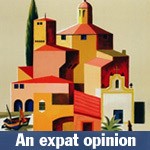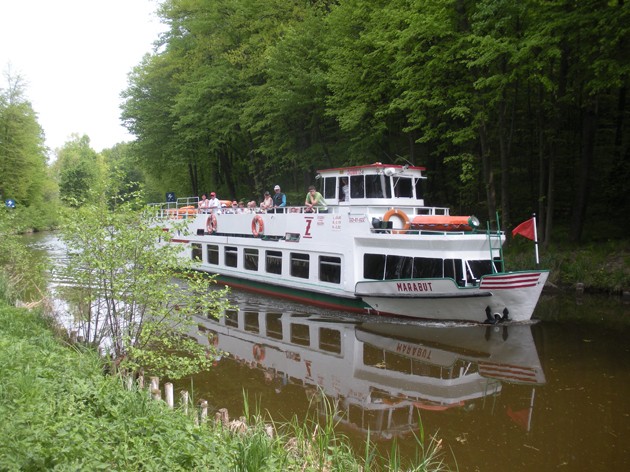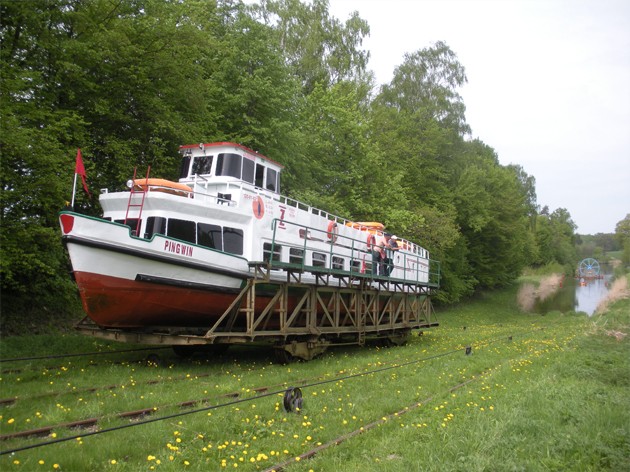 “Is the Ark buried in Poland?” asks Phill, who’s visiting us in Warsaw from the ‘Bra (Canberra, for those not from our nation’s capital). I’ve just been running him through the main options for weekend trips away.
“Is the Ark buried in Poland?” asks Phill, who’s visiting us in Warsaw from the ‘Bra (Canberra, for those not from our nation’s capital). I’ve just been running him through the main options for weekend trips away.
“The Masurian Lakes would be nice — if the weather holds, which it probably won’t,” I say. “And there’s the world’s largest Jesus. It’s in a cabbage patch. And not as big as you’d think. And Wolf’s Lair, where Hitler nearly got assassinated. Like in that film, Valkyrie. The roads are bad there, but there is a converted castle nearby we could stay in. If you like castles, that is.”
“A castle?” Phill’s wife Nina’s ears prick up. She’s been completely uninterested in the planning process to this point, but there’s something about girls and castles.

“Or there’s where the Great Escape took place,” I continue. “That was here too?” he asks. I nod.
I’m sure from Phill’s perspective Poland seems like a great tourist destination. Which in many ways it is.
It’s just that I’ve had some of the excitement of travelling around Poland taken out of me by, well, travelling around Poland.
As if its terrible roads, impenetrable language and a climate God surely forgot aren’t enough, everywhere I go I seem to be met by a typical former Soviet ‘glass-half-empty’ attitude that makes it a struggle to maintain my naturally sunny disposition. This is a language that has no way of saying “to look forward to”, after all. And where “lost and found” just translates as “lost”.
Just saying.
We settle on Wolf’s Lair (with a night in a Teutonic castle), and set off the next day for what should be a four hour trip. Which, I explain, could easily take eight, Polish traffic being what it is. And could actually be our last earthly activity, Polish driving being what it is. We decide extra chocolate rations are called for. Wasn’t it the pharoahs who were buried with their most precious possessions?
As it is, three and a bit hours later we’re checking into our fourteenth century castle, and asking what there was to do there. “Not much,” replies the receptionist. “Pool, jacuzzi, sauna, bowling alley, archery, restaurant. And there’s a nightclub, but it’s only open until two. It’s just a small town, you know.” She shrugs, and I shake my head. There’s that Polish perspective again.
The next day is my third visit to Wolf’s Lair, yet it’s as fascinating as the first. Perhaps it’s all the spring dandelions growing over the concrete bunkers. Or that our ‘trusty’ GPS directed us down a dirt track that turned out to be Hitler’s personal escape route. Or perhaps it’s just really, really interesting. Either way, over lunch of freshly caught fish by a mirror-topped lake that I suspect our main dish was recently swimming around in I suggest that, since the weather seems to be holding (for now), we could, actually, stay on. “There’s a nineteenth century canal system where they hoist boats over train lines in Elblag.” ‘”Only one in the world?” Phill checks. I nod. We’re off.
There’s a fair bit of guess work involved in finding this miracle of engineering, owing to the fact that the map only tells us what it’s near. We finally head down a barely marked track — ignoring the GPS, who’s taken to repeating, ‘when possible, turn around’ in increasingly panicked tones — and pull up five minutes before the boat is due.
Sort of perfectly.
The aquatic equivalent of the station master is waiting, as he’s been done every day for the last 24 years. We can’t see around the bend, but he tells me the boat’s on its way. I ask how he knows. He points to the water in the still canal, and I notice that it is actually flowing backwards, ever so slightly.
The signs are there, if you just know what to look for.

In seconds the boat appears, steers itself gently onto a submerged trolley, and is hauled up a 1:26 incline on a 150 year old water-powered system of cables and pulleys. It solved the problem of a hundred metre height difference between the upper and lower lakes, and no-one’s yet found a better way. It takes about 30 minutes for it to traverse the 450 metre bank, which it does so photogenically that I feel like leaving here with any free camera memory would be a waste.

We wave at the tourists on board, who’ve paid 90 zlote ($30) for a five hour cruise along this canal, including five of these slipways.

But what’s actually so special about the whole thing is how the boat looks sailing down the grassy incline. It occurs to me that on the boat is actually the worst place to see that from. It’s only from here, outside, that you can see it. And we even got it for free.
After the boat’s gone, we lie on the grass for a while, enjoying the uncommonly warm day and contemplating the emerald green meadows and yellow canola fields, set off by some black and white cows that seem to serve no purpose other than to look nice in our photos. They chew their cud, we eat our chocolate. It seems we won’t be needing it for the after life just yet, after all.
“You know,” says Phill, looking out over the vista, “the only thing less than perfect with this trip has been our tour guide’s predictions.”
Perhaps I am a little hard on my adopted country sometimes. Or perhaps the Polish perspective is just rubbing off on me. Well, imitation is the ultimate form of flattery, isn’t it?
The canal master ambles past. “You’ve got a beautiful place here,” I say. “Maybe the first time,” he replies gruffly, and I want to laugh. But then he takes another look. “Or maybe we just forget to appreciate what we have.”
Perhaps we all just need to get off the boat sometimes.







Crikey is committed to hosting lively discussions. Help us keep the conversation useful, interesting and welcoming. We aim to publish comments quickly in the interest of promoting robust conversation, but we’re a small team and we deploy filters to protect against legal risk. Occasionally your comment may be held up while we review, but we’re working as fast as we can to keep the conversation rolling.
The Crikey comment section is members-only content. Please subscribe to leave a comment.
The Crikey comment section is members-only content. Please login to leave a comment.